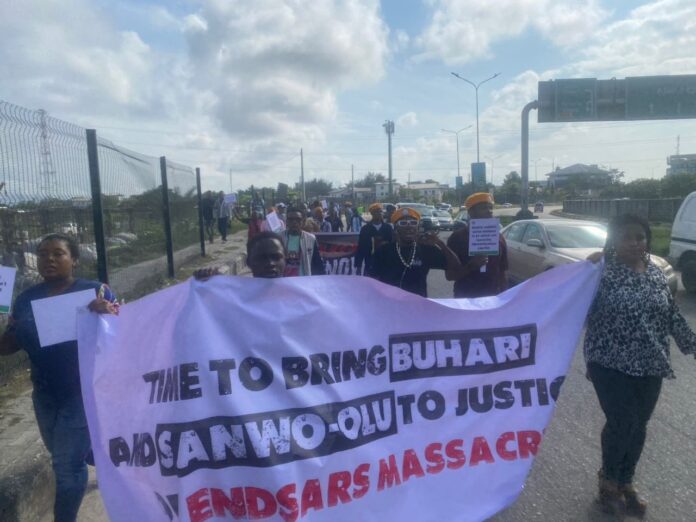Four years after the #EndSARS movement shook Nigeria, tension reignited on Sunday at the Lekki Toll Gate in Lagos.
Protesters gathered to mark the anniversary of the #EndSARS protests, demanding justice for victims of police brutality and the implementation of reforms promised by the government.
As protesters chanted, held placards, and raised their voices, the air soon filled with the choking sting of tear gas.
The Lagos State Police Command had arrived at the scene, dispersing the crowd that had gathered to remember the events of October 2020.
“Shots were fired into the air,” one protester said. “Tear gas was everywhere. People were running. I fell into a gutter while trying to escape.”
Videos shared on social media show demonstrators running for cover as thick clouds of tear gas filled the atmosphere.
Protesters had come to the Lekki Toll Gate as early as 8:30 am, holding banners and placards calling for accountability. They sought the full implementation of recommendations made by judicial panels set up to investigate the tragic events of the #EndSARS protests.
The signs they carried read, “Justice for Lekki victims,” “No more police brutality,” and “Implement the reforms now!”
The protesters say they want justice for the young men and women who were killed or injured during the 2020 protests.
One protester shouted, “We cannot forget what happened here! We want justice for those who died at Lekki.”
Another added, “Four years later, nothing has changed. The government promised reforms, but where are they?”
The #EndSARS movement began in October 2020, when young Nigerians took to the streets to protest the actions of the now-disbanded Special Anti-Robbery Squad (SARS), a unit within the Nigerian Police Force. SARS officers were notorious for committing abuses, including extortion, assault, and extrajudicial killings.
The protests spread across the country, with thousands of people calling for an end to police brutality. The movement gained international attention as Nigerian youth demanded accountability and reforms in the police system.
At the height of the protests, tragedy struck on October 20, 2020, at the Lekki Toll Gate. Security forces, including soldiers, were accused of firing live bullets at peaceful protesters.
While the government initially denied any involvement, reports from witnesses and human rights organizations suggested that multiple people were killed that night, though the exact death toll remains disputed.
In the aftermath, the Nigerian government established judicial panels in various states to investigate the events of the protests and recommend reforms to the police. The Lagos panel, in its final report, concluded that a “massacre” did indeed occur at Lekki, with calls for justice and compensation for the victims.
But four years later, protesters say those recommendations have not been fully implemented.
As tensions flared at Sunday’s rally, the police responded by firing tear gas to disperse the crowd.
The Public Relations Officer of the Lagos State Police Command, Benjamin Hundeyin, defended the police action. According to him, the protesters were causing disruptions at the toll gate, which is a major traffic route in Lagos.
“They were told to disperse, but they were adamant,” Hundeyin said. “We had to use minimal force to disperse them.”
He insisted that there was no confrontation between the police and the protesters, despite reports of arrests and injuries. Some demonstrators were seen being dragged into police vehicles, sparking outrage from the crowd.

